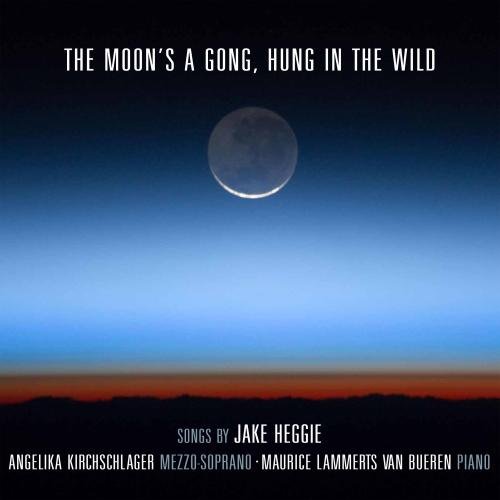HEGGIE The moon’s a gong, hung in the wild
View record and artist detailsRecord and Artist Details
Composer or Director: Jake Heggie
Genre:
Vocal
Label: Avie
Magazine Review Date: 11/2015
Media Format: CD or Download
Media Runtime: 53
Mastering:
DDD
Catalogue Number: AV2349

Tracks:
| Composition | Artist Credit |
|---|---|
| The Breaking Waves, Movement: Advent |
Jake Heggie, Composer
Angelika Kirchschlager, Mezzo soprano Jake Heggie, Composer Maurice Lammerts van Bueren, Piano |
| The Breaking Waves, Movement: Darkness |
Jake Heggie, Composer
Angelika Kirchschlager, Mezzo soprano Jake Heggie, Composer Maurice Lammerts van Bueren, Piano |
| The Breaking Waves, Movement: Music |
Jake Heggie, Composer
Angelika Kirchschlager, Mezzo soprano Jake Heggie, Composer Maurice Lammerts van Bueren, Piano |
| Folksong Arrangements |
Jake Heggie, Composer
Angelika Kirchschlager, Mezzo soprano Jake Heggie, Composer Maurice Lammerts van Bueren, Piano |
| Songs to the Moon |
Jake Heggie, Composer
Angelika Kirchschlager, Mezzo soprano Jake Heggie, Composer Maurice Lammerts van Bueren, Piano |
| Statuesque, Movement: Henry Moore: Reclining Figure in Elmwood |
Jake Heggie, Composer
Angelika Kirchschlager, Mezzo soprano Jake Heggie, Composer Maurice Lammerts van Bueren, Piano |
| Statuesque, Movement: Pablo Picasso: Head of a Woman |
Jake Heggie, Composer
Angelika Kirchschlager, Mezzo soprano Jake Heggie, Composer Maurice Lammerts van Bueren, Piano |
| Statuesque, Movement: Winged Victory: We’re Through |
Jake Heggie, Composer
Angelika Kirchschlager, Mezzo soprano Jake Heggie, Composer Maurice Lammerts van Bueren, Piano |
| Winter Roses, Movement: Looking West: Sweet Light |
Jake Heggie, Composer
Angelika Kirchschlager, Mezzo soprano Jake Heggie, Composer Maurice Lammerts van Bueren, Piano |
| White in the moon |
Jake Heggie, Composer
Angelika Kirchschlager, Mezzo soprano Jake Heggie, Composer Maurice Lammerts van Bueren, Piano |
Author: Edward Seckerson
But it needs careful, finely nuanced handling if the operatic elements of songs like these are not to appear overly ripe or self-consciously ‘arch’ – and that’s the issue I have with Kirchschlager. She enunciates with care out of her native language; and though she is clearly a stage animal, whether on concert platform or opera stage, these performances, for my taste, are always inclined to feel overworked – too big, too primary for the intimacy and delicacy of the settings. It’s tough striking a balance when the natural inclination of an operatic voice – and indeed an operatic personality – is one of projection rather than inwardness.
In Statuesque (words by Gene Scheer, a regular collaborator), the sculptural curvaceousness is there but the ‘living statues’ (there is a kinship here to the dramatic Camille Claudel cycle Into the Fire which Joyce DiDonato has so made her own – Pentatone, 1/14) are distinctly operatic in manner and I can’t help feeling that I would like to hear them sung by a singing actor as opposed to an acting singer. Equally, the characterisation in the wonderfully inventive and quirky Songs to the Moon does not slip effortlessly into the musical vernacular of the settings, particularly when Heggie so casually courts with jazz.
In The Breaking Waves – three songs to words by Sister Helen Prejean, she of Dead Man Walking, Heggie’s much-admired and successful opera – I don’t feel a natural empathy with gospel singing which is so integral to the settings. It needs to be felt rather than imitated. The rather chilly hall acoustic of the recording doesn’t exactly draw one in, either.
Kirchschlager is at her best when she stops ‘playing’ the drama and relaxes into a vocal line, plain and simple. Winter Roses typifies Heggie’s natural way with melody, and hearing him ‘frame’ the traditional folksongs – ‘Barb’ry Allen’, ‘He’s gone away’ and ‘Danny Boy’ – reminds me of Britten in that the arrangements are at once respectful and freeing. ‘White in the Moon’, the final AE Housman setting, sets the seal on what we knew all along – that Heggie has a way with words.
Discover the world's largest classical music catalogue with Presto Music.

Gramophone Digital Club
- Digital Edition
- Digital Archive
- Reviews Database
- Full website access
From £8.75 / month
Subscribe
Gramophone Full Club
- Print Edition
- Digital Edition
- Digital Archive
- Reviews Database
- Full website access
From £11.00 / month
Subscribe
If you are a library, university or other organisation that would be interested in an institutional subscription to Gramophone please click here for further information.




